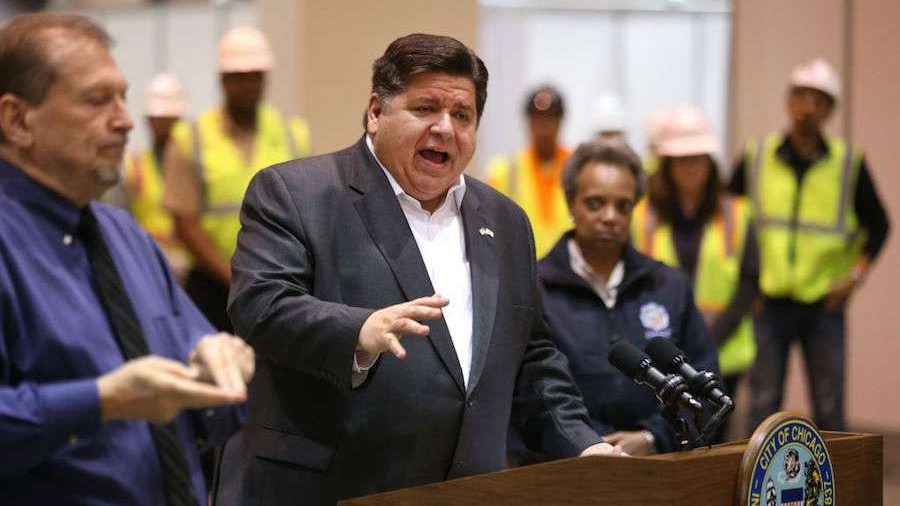The state of Illinois relaxed its restrictions on churches on Thursday, after Supreme Court Justice Brett Kavanaugh ordered the state to respond to three lawsuits brought by churches.
At a press conference May 28, Gov. JB Pritzker said that the state’s public health department would be issuing “guidance, not mandatory restrictions” for faith leaders to hold religious services, loosening the state’s restrictions on religious gatherings during the pandemic.
The Thomas More Society, which had filed several lawsuits on behalf of several Illinois churches against the state’s public health restrictions, said the announcement was a victory for religious freedom.
“By issuing guidelines only and not the previously announced mandatory restrictions, he [Pritzker] has handed a complete victory to the churches in Illinois,” said vice president and senior counsel Peter Breen.
The three lawsuits alleged that the state had illegally discriminated against religion and violated the U.S. and Illinois state constitutions, as well as the state’s Religious Freedom Restoration Act.
In a lawsuit filed on behalf of several churches on May 27, the Thomas More Society said the state had placed churches “on the second shelf,” subject to stricter rules than even liquor stores and marijuana dispensaries. Pritzker had exceeded his lawful authority by issuing restrictions that would last for months into the future instead of a fixed 30-day period, the society added.
The group appealed its cases to the U.S. Supreme Court, and Justice Brett Kavanaugh on Thursday ordered the state to respond to the churches’ complaints.
Now, the state’s guidance will include suggestions for capacity limits, cleaning protocols, sharing food, and safe conduct of outdoor services, Pritzker said. “For those that want to conduct in-person activities, IDPH is offering best practices,” he said.
Previously, on May 6, Pritzker announced a five-phase plan for reopening the state where churches would not be able to hold religious services with more than 50 people until “phase 5,” where a vaccine or treatment would be made widely available, or after a sustained period of no new cases of the virus.
Illinois’ plan was one of the strictest in the country in terms of its limits on public gatherings. Public health officials have cautioned that a vaccine might not be available until at least the end of 2020, if not midway through 2021.
Until “phase 4” of Pritzker’s plan, religious services could only be held with 10 or fewer people in attendance. Strict health requirements would need to be met for the state to advance to that phase, including a low test positivity rate, no increase in hospital admissions for 28 days, and widespread testing and contract tracing.
Earlier in the pandemic, the state placed residents under a strict stay-at-home order that did not allow for in-person religious services. Health department director Ngozi Ezike warned churches in early April not to hold in-person services.
On April 30 the Thomas More Society filed a lawsuit on behalf of The Beloved Church in Lena, Illinois, to allow for citizens to be able to leave their homes for religious services. By that night, the governor’s order included a paragraph listing religious services as permitted “essential” activities for which people could leave their homes.
The next day, May 1, the Archdiocese of Chicago announced it would begin resuming public Masses with no more than 10 people in attendance.
The Thomas More Society subsequently challenged Pritzker’s ongoing health restrictions on churches, which limited religious gatherings to no more than 10 people, resulting in the decision from the Supreme Court.
Responding to Prizker's announcement, the Diocese of Springfield said on Thursday that Bishop Thomas Paprocki has granted permission for public Masses to resume from June 6-7, with congregations limited to 25% of the church's capacity.
"Diocesan staff had already been preparing a training and certification process to prepare parishes to open public Masses with proper precautions, including detailed cleaning protocols and communication plans to parishioners, and limited attendance," the diocesan statement said.
Bishop Paprocki said that Catholics in Springfield - the state capital - "have made a profound and consequential sacrifice for the sake of the greater good by foregoing the most sacred sacrament of our faith - the Holy Sacrifice of the Mass.”
"We have done so with particular concern to do our part in preventing a surge in hospitalizations that may have overwhelmed health system capacity and out of concern for the most vulnerable among us," he said.
"We have all done our best to unite in prayer and acts of spiritual communion during this time, offering this sacrifice for the good of our neighbor. It is now time for the Church to return to the proper practice of the faith and celebration of Mass, which we will do responsibly and safely."

